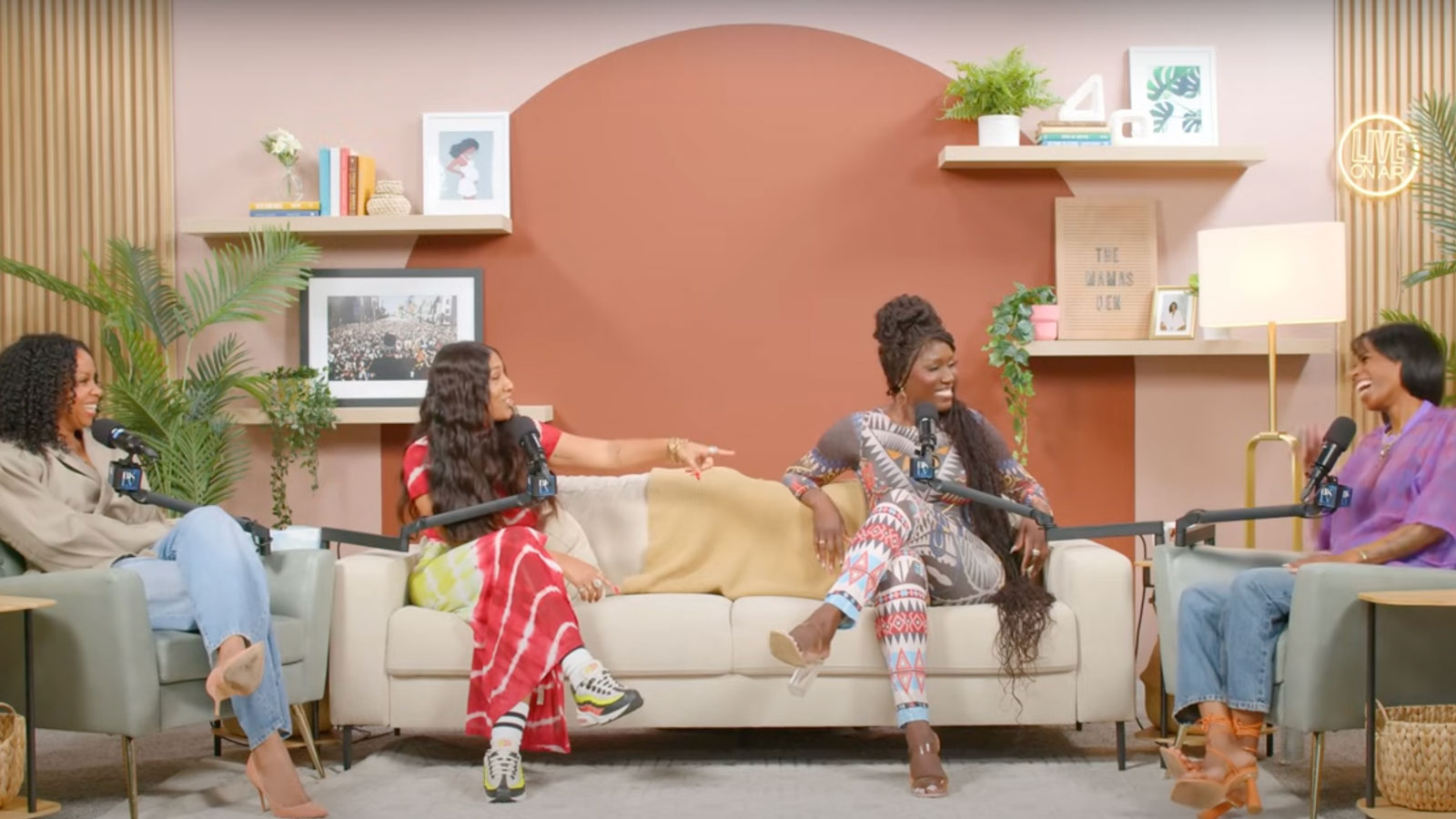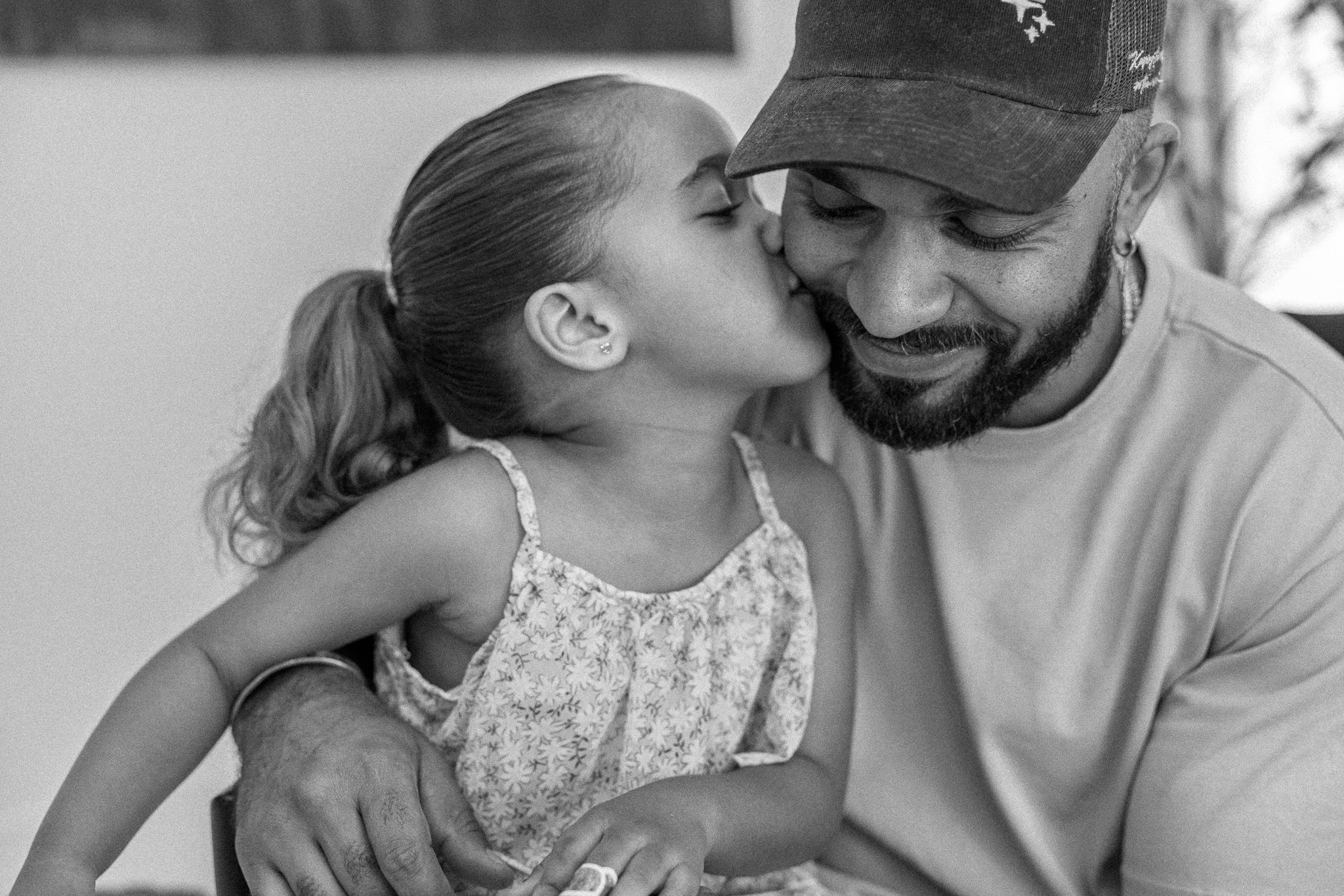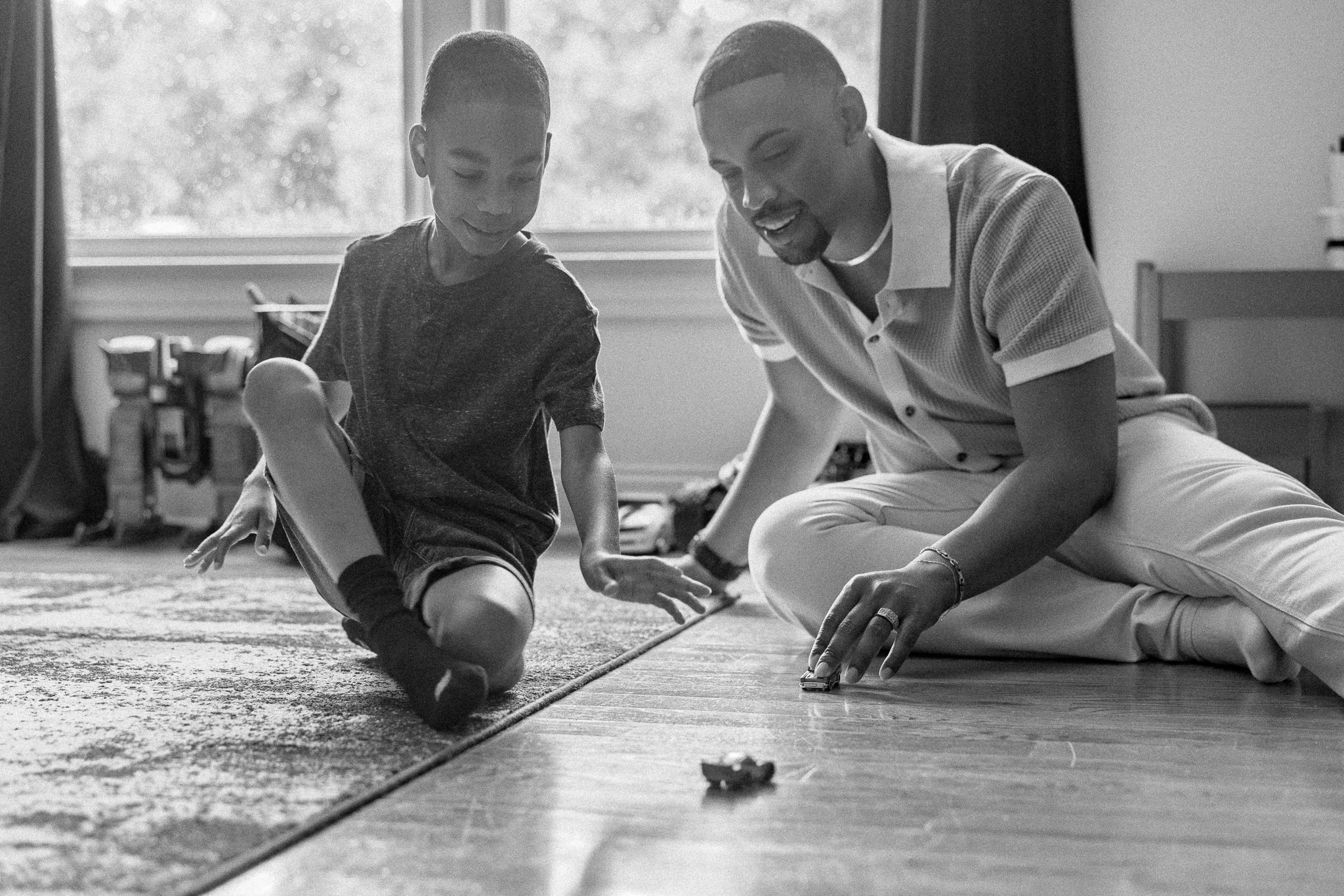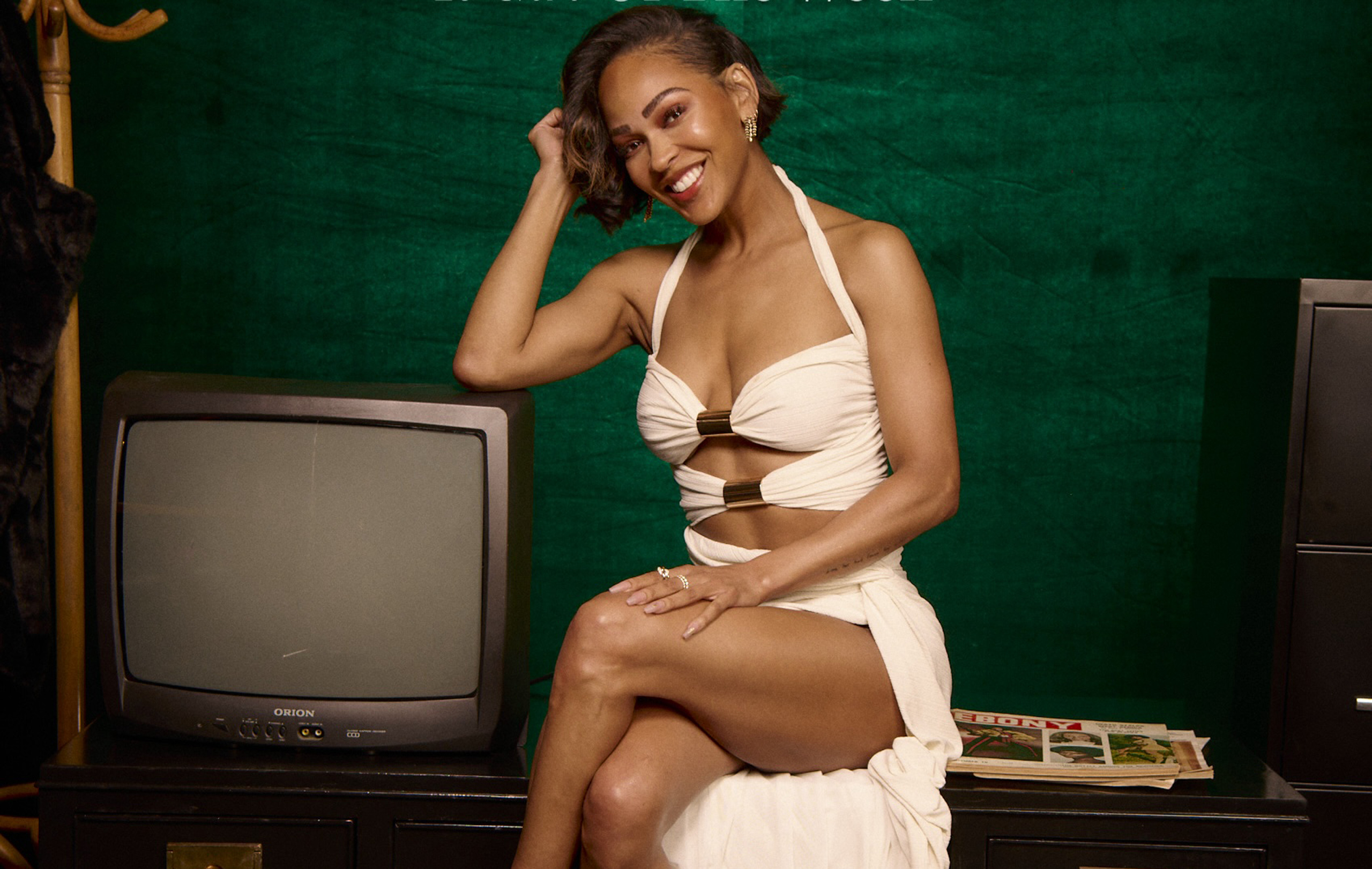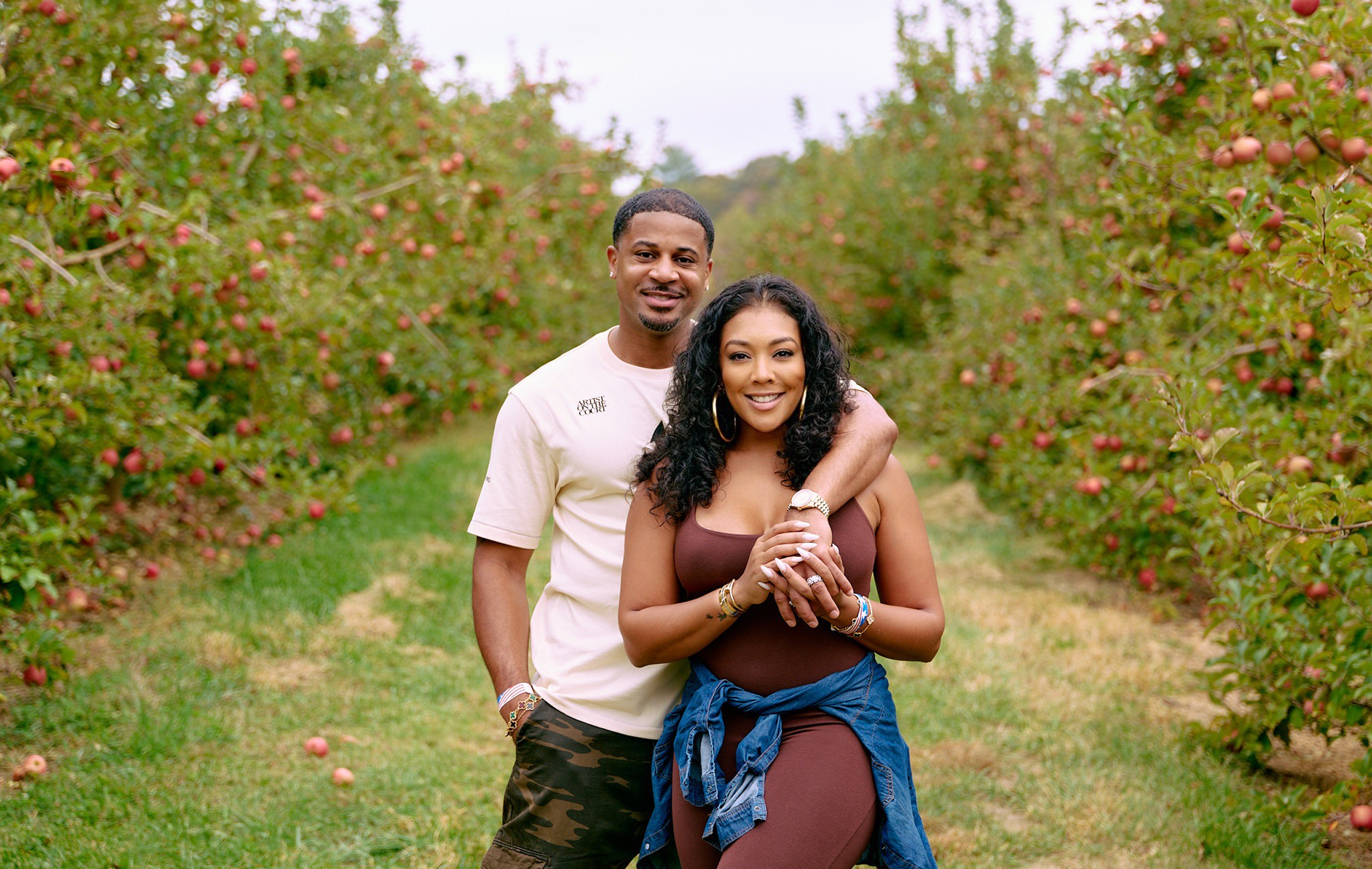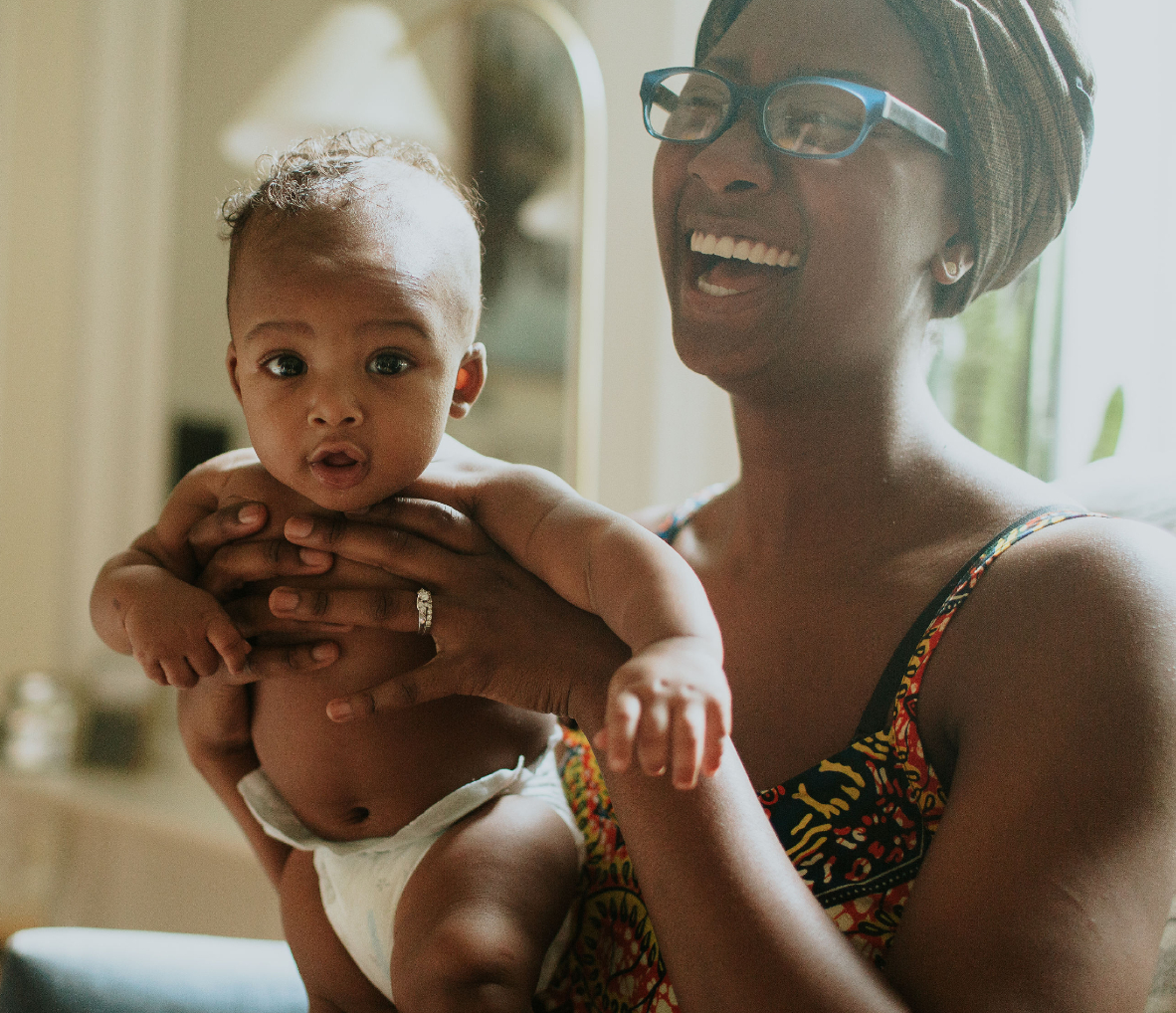
Laurel Gourrier with her baby (Courtesy of Birth Stories in Color)
I’ve always known I wanted to be a mom. Pregnancy, childbirth, and motherhood were things I studied often in subtle ways, for as long as I can remember. I kid you not. I loved the movie Juno and MTV’s Sixteen & Pregnant just so I could watch the experience of bringing a child into the world and think, “well, if they can do it, I should be OK.” I feel fortunate I worked for a film festival for a few years where a colleague premiered a documentary called Birth Story.
The premise of the film involved a long-time midwife named Ina Mae Gaskins, who launched her career as a midwife in the 70s delivering babies on a self-sustaining farm of her and her husband’s group of hippie friends. I’m summarizing, of course, but these were literal hippies. Birth Story was really my introduction to childbirth outside of hospitals and what our bodies can do as women.

Codie Elaine Oliver, 2016 (Photo courtesy of Chika Chukudebelu)
Once I was pregnant for the first time, back in 2016, I immediately started looking at all of my options. I knew I wanted as little medical intervention as possible. That meant ideally no drugs at all and definitely, not a C-section if I could help it. This went against everyone I knew, including my mom, who had two C-sections and the same for my sister. I had a few friends whose birth stories inspired me, but not much else.
While preparing for my firstborn, in addition to watching women give birth on YouTube (y’all see my dedication to this??), I read a book by Ina Mae Gaskins. But she has since made some extremely disparaging remarks about Black women, so I am not going to promote it here. The book was made up of countless birth stories at the farm. These were first-person accounts of the hours or days it took to give birth. Every story was an empowering example of what was possible. No matter how challenging, unplanned, or perfectly smooth, at the end of delivery there was a healthy baby. Put simply, it was what I needed night after night to remind myself I could do this.
BUT…
Almost none of the women in that book looked like me, and that always bothered me. To get right to it, I am still obsessed with birth stories. Now that I have three babies (two pregnancies — one with twins — and two births that come full circle, but that’s a story for another day), I am obsessed with making sure women, especially Black women, feel supported and empowered during pregnancy and childbirth. I can’t tell you how exciting it is to me when I discover something that gives Black women a voice when we are often left out of the conversation.
So when I stumbled upon a website and podcast called Birth Stories in Color run by two birthing doulas in Columbus, Ohio, I was beyond thrilled! Meet Laurel Gourrier and Danielle Jackson, wives and mothers, and practicing doulas who started this platform to use storytelling as a means of equipping expecting parents. Sharing real birth stories is one way to discover the expected and unexpected parts of the journey to becoming parents, and these two were led to create a platform honoring birth stories from families of color. Find out more about the podcast, what it’s teaching Laurel and Danielle, and ways you can have a peaceful birthing experience.
—Codie Elaine Oliver, Editor in Chief
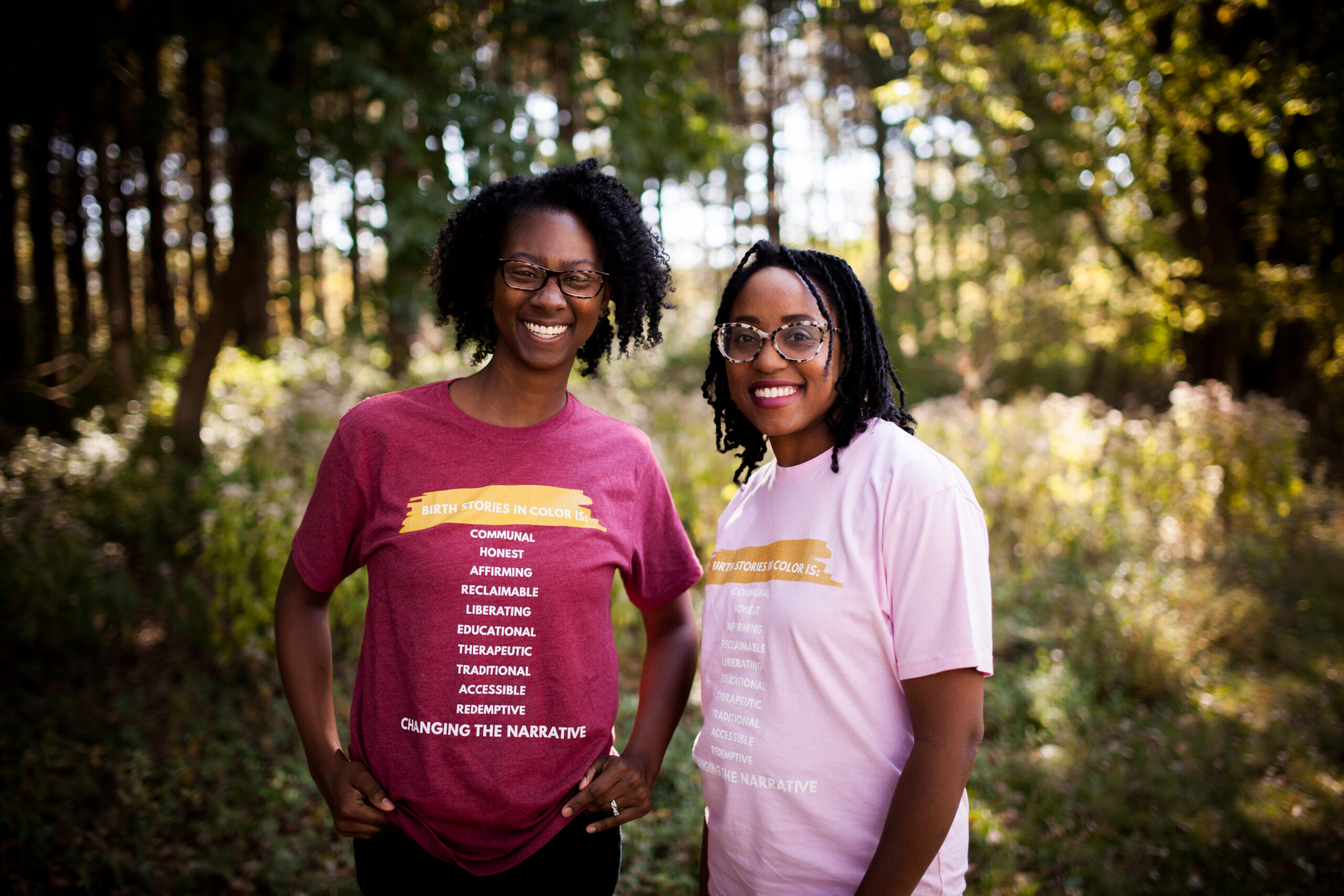
Laurel Gourrier and Danielle Jackson (Courtesy of Birth Stories in Color)
Codie Elaine Oliver: Hey ladies! I am thrilled to chat with you. Can you tell me how many podcast episodes you’ve done, and how would you describe the range of birth experiences?
Birth Stories in Color: We have 34 episodes with women from their 30s to 50s and a good collection of different types of birth. We have NICU stories, surgical births, unassisted births, home births, hospital births, twins, breech, and VBAC (vaginal birth after cesarean). We have home births with transfer to the hospital as well. When we generally hear birth stories, you think about actually birthing, but within that, we also talk about the parenthood journey being collective. In that, we are planning to do stories about surrogacy and adoption as well.
BL.com: Besides my ridiculous level of excitement, what has been the response?
Danielle: We get a lot of feedback from birth workers, particularly nurses that are working in Labor & Delivery, and they love it. They love being able to hear what patients are actually paying attention to and how it can inform their own work, especially as they’re being taught more about what’s going on with Black Maternal Health, and they’re really concerned. Some of them are kind of taking the perspective of themselves. Like, “What am I doing that may be contributing to this, and how am I able to support these families moving forward?” So it’s a teaching tool for some of them as well.
Laurel: And our families that share say the same sentiments that you have, that it’s just nice to have a platform that’s centered around our stories. Stories they can use as a tool or just because they want to listen and connect with like “Oh, that happened to me too.” Some of our storytellers have had postpartum depression, and we talk about that too.
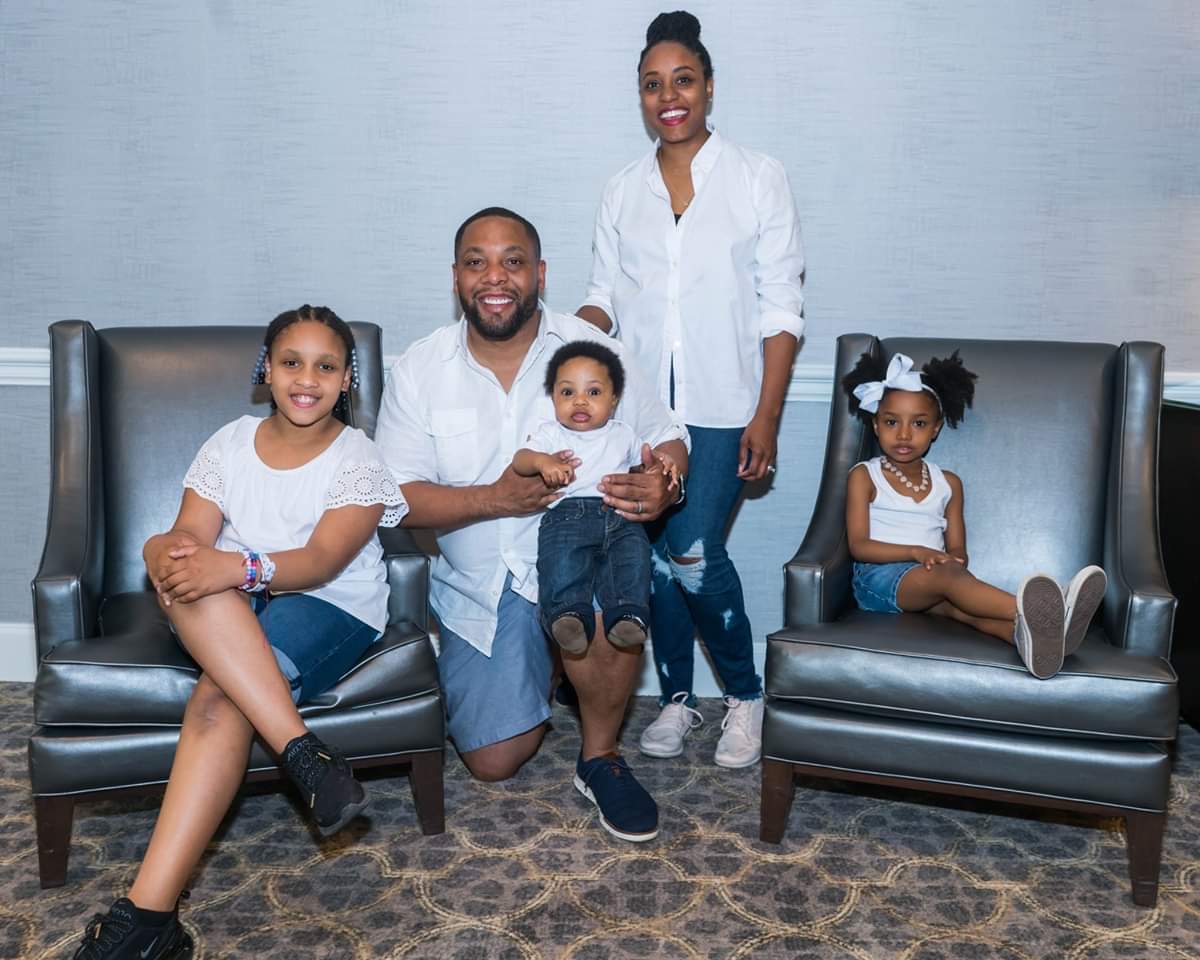
Danielle Jackson and her family (Courtesy of Birth Stories in Color)
BL.com: So both of you are moms. Danielle, you have three and Laurel, two, right? What has each of you learned since starting the Birth Stories in Color podcast? What is this experience teaching you?
Danielle: I would say for me it is balance in all things. [The podcast] allows us to have this thing that’s separate from our family, but also a continuation of the work we both do because we’re both birth doulas as well. So that ties things together in a different way for us by allowing us to see that there are so many other women out there, taking care of their children, doing the birth work because we do speak to a lot of birth workers [on the podcast]. They may share their birth, but they share their work as well.
It’s allowed us to meet a lot of other individuals even virtually, like in the video chat. We are also building a community within the community. There’s this whole Black birth worker world that we are now part of that’s worldwide that’s been important for us. Because I feel like you connect with them, we’re learning from them. By taking the ego out of it, it’s like she has the knowledge, I’m going to get it, and it’s reciprocal. We’re sharing our platforms and allowing community and partnership in the work that we do.
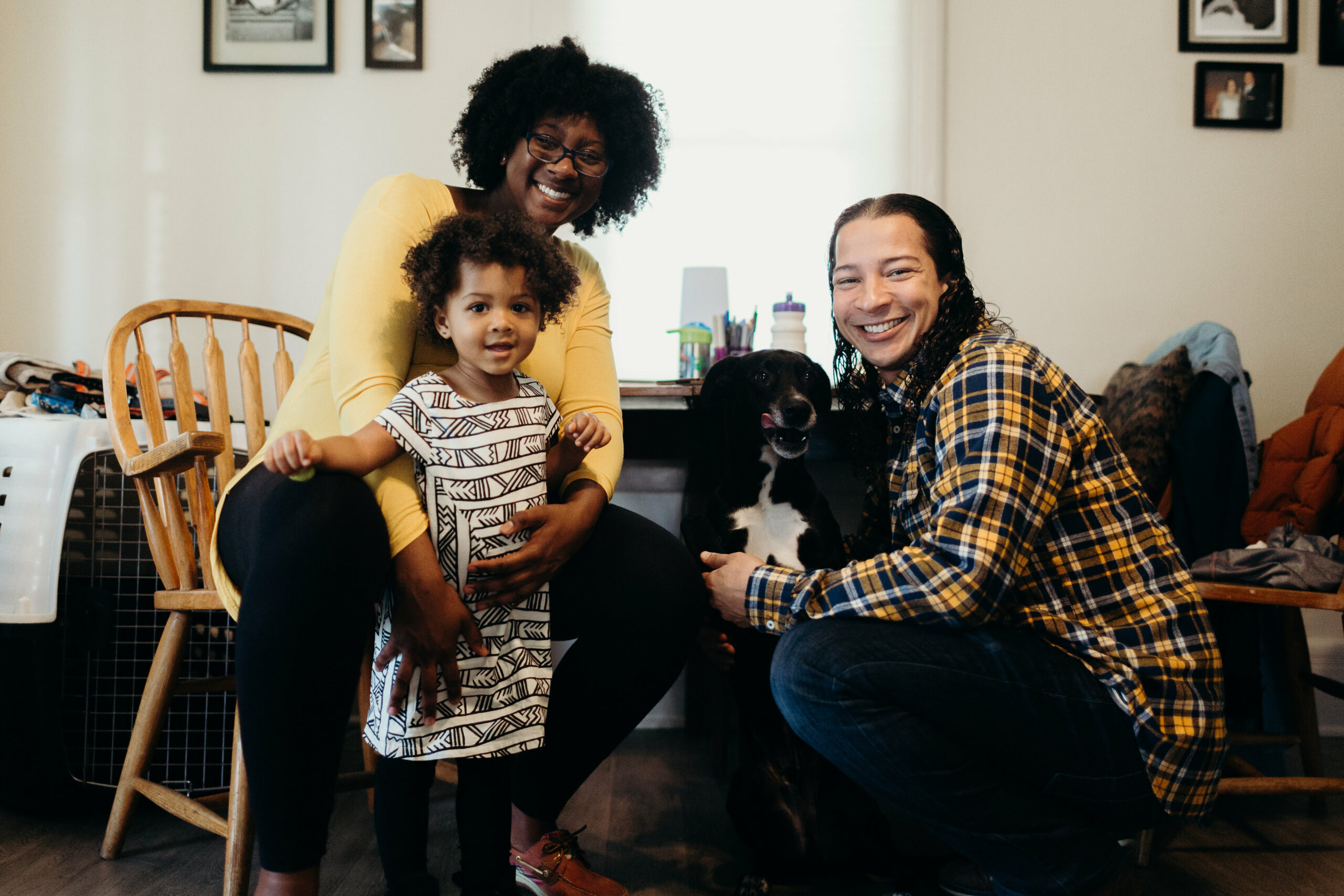
Laurel Gourrier and her family (Courtesy of Birth Stories in Color)
Laurel: And I think it breaks down the colonization piece. Danielle is really great about reminding me of this. We totally invite our storytellers to have their kids with them [when recording the podcast]. It doesn’t always have to look a certain way. Our kids are a big part of life. For many of us, we started this work out of a response from our own experiences. Yes, it’s important to have our separate selves, but they’re a part of this experience as well.
BL.com: Yes, tell us more about your work as doulas.
Laurel: In addition to the podcast, we’re both birth workers within the organization ROOTT. Birth work is now my full-time job, but I’m also a family special education family advocate, and I work with a couple of families within that.
Danielle: We both work with ROOTT, which stands for Restoring Our Own Through Transformation. It’s a Black women-led reproductive justice organization. We do the doula work, but there’s also some policy advocacy. We also do postpartum work, and we have lactation support. Laurel is a lactation counselor too.
Laurel: Forgot that!
Danielle: ROOTT is Columbus, Ohio based and we work through most of Franklin County. Occasionally, if we need to come outside, it’s generally about 100 miles outside of Columbus because, here in Ohio, we have some pretty disparaging numbers. So we are supporting Black women first. They take priority. Women of color, and that’s where we draw the line.
Related: Black Obstetrician/Gynecologist Dr. Jessica Shepherd on the Importance of Maternal Health
BL.com: As Black people, our understanding of birth workers outside of a traditional hospital can be all over the place. It can depend on your circle, where you live, what and who you are exposed to, etc. Is providing doula services to women of color in Columbus a booming business, or are folks still figuring out what a doula is?

Laurel Gourrier with her baby (Courtesy of Birth Stories in Color)
Laurel: I think many are still figuring it out. And I think more and more individuals are also still figuring out what the difference between a doula and a midwife is. That is a conversation that we have to have. Within that conversation, we as ROOTT doulas work differently than most doulas. Some know about a home birth but aren’t actually really sure or don’t necessarily have the support to say, “Maybe I do want to go down that route,” but most of our families are having hospital births.
BL.com: So most of your families are having hospital births but choosing to have a doula?
Laurel: Yes.
Danielle: We’re doing pretty good at getting the word out about who we are and what we do, and there’s a lot of word of mouth. A lot of times we get intakes, and it’s like, “Oh my friend told me about you guys” or “this person told me about you” and that is the best way because it allows people to have a personal interest in it and they can see that somebody they know does it. So it makes it more normalized, and it doesn’t seem like “Oh, I’ve got a doula. I’m a hippie.”
Of course, seeing it in the mainstream [helps], but actually getting people to understand the difference between a ROOTT doula and others. We do some of the same things that doulas do, but, particularly because our actual clients are Black women, we get down to what’s going on in your family. What’s going on in your nutrition, and what’s going on at your provider. Are you feeling heard? We help people learn how to advocate for themselves, but we’re also ready to help advocate in person as well.
Related: Impacting the Black Maternal Health Crisis by Being Informed
We go to appointments even when they’re just getting checked because they are concerned. Even if it’s not time to go into labor, we are there, and we’re showing up in a different way that might not look the same as some other doulas, which can be kind of off-putting to some people because they’re not expecting somebody to show up for them in that way. But we do it, and it is, of course, with respect to the family.
BL.com: Since you’re both birth doulas in addition to this amazing platform that you’ve created. What suggestions would you give Black parents or expecting parents for how they can personally impact their own maternal health and infant mortality rate. What can we do for ourselves?
Laurel: Create your birth team like you were planning your birthday party guest list. Who’s going to be there to hype you up? Who’s going to be there to make sure that everything is set in place? Who’s going to be there to walk you out if things get a little rowdy? Make sure your birth team consists of people who, including your care provider, understand how you want your birth to go.
Many people walk into it and like “Oh, it’s my care provider, I’m going to do what they say.” No. Your care provider is there for you. You call the shots and, of course, take in the information and if it feels good to you, go with that. You figure out what makes sense and what doesn’t make sense, but you should be calling a majority of the shots.
But yes, that includes your care provider, your partner, or other support people that you might have with you and your doula if you have one. Make sure you really have a team that is there to support you whatever your decisions are and to be an advocate for you. We always tell our families the energy other people bring into your birth space can change it, minute by minute, and you want to make sure that you have people who can understand if they’re told: “You need to step out right now because you’re not handling this space very well.”

Laurel Gourrier and Danielle Jackson (Courtesy of Birth Stories in Color)
Danielle: Additionally, I would say preparing to be pregnant. Before anything ever even happens, recognize what your body is doing right now while you’re not pregnant because it could change drastically, or it could potentially really expose what’s going on with your body, and it becomes more emergent [once you do become pregnant]. Know what’s going on in both partners’ health. I realize there’s not a lot of research and information out there about dads in their health and how it affects pregnancy, but it does. So it’s important to know what’s going on with the both of you. Knowing things such as if you have a sickle cell trait, which is important because some people have no clue about their bodies right now, and that type of information becomes important.
BL.com: Is there anything else we should know about you?
Laurel: I want to remind people that anyone can share their story. I think sometimes people believe there’s a specific way a birth story should sound or be, and that’s not the case. Your experience is valid. It is real, and it is essential, and there’s someone out there who will connect with it in some way.
Whether you had your baby yesterday or 20 years ago, if it’s a story of loss, if it’s a birthing experience that you feel is totally unique, whatever it is, we want to add it to our community. There’s someone who will connect with you in that same way. Find us at birthstoriesincolor.com. We’re on Instagram and Facebook at @birthstoriesincolor. We are on all of the podcast platforms, Spotify, SoundCloud, iTunes, Google Music, and Stitcher.
Related Articles
Bozoma Saint John talks Black motherhood, grief, self-love, and finding joy again. Don’t miss her powerful conversation on building legacy and living boldly.
Tyler Lepley shows the beauty of Black fatherhood, blended family life with Miracle Watts, & raising his three children in this Father Noir spotlight.
Black fathers Terrell and Jarius Joseph redefines modern fatherhood through love, resilience, unapologetic visibility in this Father Noir highlight.
Featured Articles
When Elitia and Cullen Mattox found each other, they decided that they wanted their new relationship together, their union, to be healthier and different.
Celebrate their marriage and partnership with the release of the documentary “Time II: Unfinished Business”
The vision for our engagement shoot was to celebrate ourselves as a Young Power Couple with an upcoming wedding, celebrating our five year anniversary - glammed up and taking over New York.
Meagan Good and DeVon Franklin’s new relationships are a testament to healing, growth, and the belief that love can find you again when you least expect it.
Our intent is to share love so that people can see, like love really conquers everything. Topics like marriage and finance, Black relationships and parenting.
HEY CHI-TOWN, who’s hungry?! In honor of #BlackBusinessMonth, we teamed up with @eatokratheapp, a Black-owned app designed to connect you with some of the best #BlackOwnedRestaurants in YOUR city – and this week, we’re highlighting some of Chicago’s best!

